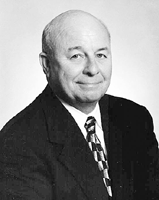DOE Awards Graduate Fellowships in Computational Science
June 17, 2000

Computational science is essential to accomplishing DOE's mission, says C. Edward Oliver, "and there is a major shortage of computational scientists in the U.S. today."
"Computational science is essential to accomplishing the Department of Energy's mission, and there is a major shortage of computational scientists in the U.S. today," says C. Edward Oliver, director of DOE's Office of Advanced Scientific Computing Research. "This fellowship program is an important component in DOE's effort to remedy this problem. Fellows in this program have become integral parts of the national science fabric as they join the university, industry, or federal laboratory communities."
"I feel like I've been offered an excellent opportunity in this fellowship," says Benjamin Keen, a new fellow from the University of Michigan. "It will offer me the freedom to pursue the interests I've developed so far and will help me make best use of the resources at Michigan. Ever since high school, I've wanted to be a research scientist in government or industry, and the CSGF is a key part of achieving this goal."
The highly competitive CSGF program provides a monthly stipend of $1800, along with payment of all the fellow's tuition and fees at a United States university. Students are required to follow a program of study that demonstrates curricular breadth through academic achievement in a scientific or engineering discipline, computer science and applied mathematics. An advisory committee evaluates and approves each fellow's program of study so that it meets the goals of both the student and the fellowship.
Fellows complete a three-month practicum at a DOE laboratory and participate in an annual fellowship conference. The conference provides a forum for fellows to present their research and an opportunity to attend presentations by the nation's leading computational scientists.
The 2000-01 fellowship recipients are:
Matthew Anderson, physics, University of Texas-Austin; Devin Balkcom, robotics, Carnegie Mellon University; Gavin Conant, biology, University of New Mexico; Ryan Elliott, aerospace engineering, University of Michigan; Matthew Fago, aeronautical engineering, California Institute of Technology; Catherine Grasso, chemistry and biochemistry, UCLA; Boyce Griffith, computational and applied mathematics, New York University; Daniel Horner, chemistry, University of California-Berkeley; Ahmed Ismail, chemical engineering, MIT; Benjamin Keen, mathematics and scientific computing, University of Michigan; Justin Koo, aerospace engineering, University of Michigan; Michael Kowalok, medical physics, University of Wisconsin-Madison; Boris Kozinsky, physics, MIT; Heather Netzloff, physical chemistry, Iowa State University; Catherine Norman, applied mathematics, Northwestern University; Pauline Ng, bioengineering, University of Washington; Tasha Palmer, chemical engineering, UCLA; Nathan Rau, civil engineering, University of Illinois-Urbana; Robert Sedgewick, physics, University of California-Santa Barbara; Collin Wick, computational chemistry, University of Minnesota.
The Krell Institute, which administers the CSGF program, can be contacted for additional information at (515) 292-4103; www.krellinst.org.

